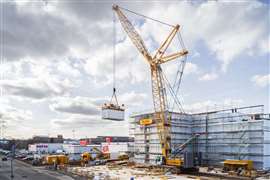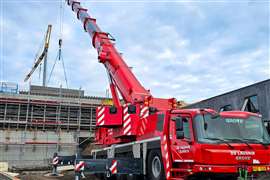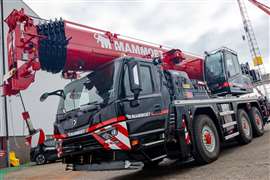Blazing trailers
17 April 2008
Several factors contribute to the vibrant North American trailer market, the driving force being the recent push for the development of natural resources, says Garry Smith, sales manager for Aspen Custom Trailers in Nisku, Alberta, Canada.
“Particularly the thrust for the development of energy producing resources [has opened new markets],” says Smith. “Specifically, for petroleum resources and oil and gas development. We are doing an awful lot of specialized trailers for transporting compressors to the oil fields and generators for the electrical end. And then, of course, the big wind energy thrust caught people flat footed.”
Smith says that 2005 was a fantastic year for virtually every North American trailer manufacturer, Aspen included. “The trailer industry has been overwhelmed,” he says. “Everyone is so far out with trailers addressed to those industries. It's difficult for the trucking companies to plan for more than a year ahead of time, but right now you have to or you don't get anything.”
Specialized market hot
Catering to the larger, more specialized end of the market, Aspen builds trailers with 13 axles or more that have 85 ton capacity or higher.
“I only see a certain segment of the market, but as far as what I see, the market is really busy,” he says. Smith says his company has had to decline business more than ever before due to customers needing specialized trailers that are so unique they require a heavy burden on engineering and design upfront, which, in turn, makes them difficult to justify building just one or two units.
“We have to manufacture quantities to substantiate the amount of cost,” Smith says. “This is a departure for us. We've built our reputation on the strength of being able to listen to what our customers are asking for and respond. Currently the load being put on deliveries is more than we can generally keep pace with. So we are having to focus on variations of the same [product] without having to re-invent.”
Butch Odegaard, national accounts manager at Trail King, says his company had a strong year in 2005 and expects a “really good” 2006 and most of 2007. “There's a need for specialized trailers in the wind energy industry and that is good for the specialized trailer manufacturers, which we are,” he says.
For the most part, Odegaard thinks the demand for trailers is coming from companies that are replacing older trailers for those that will offer higher capacities and more features. In addition, he says many transport companies are buying new trailers in an effort to expand their businesses because the work is there. He says that there are fewer smaller trucking firms than there have been in the past, as well. “The larger companies are increasing in size to take up demand for the smaller ones that have gone by the wayside,” he says.
Trail King manufactures a complete line of trailers, including open deck trailers and materials hauling trailers.
World demand
Liddell Trailers, based near Birmingham, AL, produces custom trailers for the specialized transport industry. Specializing in the 9 to 13 axle market trailers, Liddell doesn't build any type of production trailer, focusing on the particular hauling need of each client. Primarily, Liddell trailers are going to companies that will use them to haul wind turbine components and oilfield or refinery components, as well as specialized heavy hauling, according to Scott Liddell, sales manager.
“We had a wonderful year last year and this year looks like it will be better than last year,” Liddell says. “Right now, all markets in the heavy haul segment are doing well.”
With customers around the world, Liddell built several trailers for a company based in Iceland. “This gentleman first e-mailed me and then called me,” says Liddell. “We could hardly understand each other but we finally determined that he would come see us. He and his brother showed up with a big pile of specifications.”
Liddell sold the brothers five 80 ton, five-axle trailers, shipping them to Iceland where they do all sorts of heavy haul work, the most interesting of which was the transport of an historic boat, a Viking ship, that is being restored and then will be moved to a museum.
Fontaine Specialized sells a few of its trailers direct but mainly sells through its network of 120 dealers. Fontaine's biggest market has been for the 35 ton capacity mechanical removable over the road trailer as well as 55 ton capacity over the road trailers, according to Jerry Rothwell, key dealer manager for Fontaine Specialized.
“With the smaller 35 ton trailers, they are lighter, and they offer more diversity, and they are used for hauling longer distances,” Rothwell says. “The larger trailers, the 55 ton capacity trailers, they are running closer to home, mostly road builders and heavy construction contractors, who use these trailers to move construction equipment.”
Flexible mid-sized
Fontaine builds from 35 to 55 ton capacity trailers, including mechanical removables, mechanical removable extendables and hydraulic removable goosenecks. The company also builds flat beds and drop deck trailers as well as aluminum trailers.
Based in Albion, PA, Rogers Trailers caters to a variety of hauling markets with its trailers, which span in size from 20 to 25 ton capacity tag-alongs and tilt tops to its Ultima Series goosenecks that range from 35 to 60 ton capacity. Rogers also builds trailers to individual customer specifications, mainly in the 100 ton capacity range.
Rogers has developed a following for its lowboy trailers, which are suitable for moving construction equipment. Recently the company built a custom trailer for Stone Industries. The 55 ton capacity detachable gooseneck trailer has front folding ramps, removable wheel pockets and center boards, air suspension and auxiliary battery power so the lights and safety lights function when disconnected from the tractor.
Lightening up
Stone Industries' John Ciampo says the company uses the trailer to haul rubber tire loaders, excavators, a Grove rough terrain crane, a milling machine, a rock drill and various other pieces of equipment it owns. “We can haul our excavator without breaking it down, while still staying within the legal height limits, saving us both time and money,” Ciampo says.
Due to the demand for customized trailers designed for individual needs, the trends in trailer design are all over the place, Aspen's Smith says. “We are seeing a focus on lighter equipment, air ride suspension on trunnion axles and disc brakes,” he says. “With customers in North America fighting for every 100 pounds of payload, the lighter trailers are a trend.”
In the larger capacity trailers, especially those that haul wind turbine components, steerable trailers are a must, Smith says.
One thing that puzzles trailer manufacturers is that increased trailer prices haven't deterred buyers. “This market requires a different way of thinking than we and our customers have been accustomed to,” Smith says. “We've been shocked with the fluctuation in price of all components, especially steel. But the residual effect is that our price points have been shocked.”
He says that customers who haven't bought a trailer in five or six years are clearly “shocked” when they hear the prices of new trailers. But most of them go ahead and sign on the dotted line.
STAY CONNECTED


Receive the information you need when you need it through our world-leading magazines, newsletters and daily briefings.
CONNECT WITH THE TEAM











